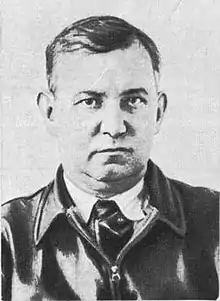Boris Lisunov
Boris Pavlovich Lisunov (Russian: Борис Павлович Лисунов; 19 August 1898 – 3 November 1946) was a Soviet aerospace engineer.
Boris Lisunov | |
|---|---|
 Boris Lisunov | |
| Born | 19 August 1898 |
| Died | 3 November 1946 (aged 48) |
| Nationality | Russian Empire, Soviet Union |
| Education | Zhukovsky Air Force Engineering Academy |
| Occupation | Engineer |
| Engineering career | |
| Discipline | Aeronautical Engineering |
| Employer(s) | Myasishchev design bureau |
| Projects | Lisunov Li-2 |
Biography
Lisunov was born in Durnovskaya (now Rassvet) stanitsa, Yenotaevsky uyezd of the Governorate of Astrakhan, Russian Empire. His father was a Cossack officer.
In 1918 he graduated from the Saratov secondary school #2 and went to Moscow to study at the Zhukovsky Air Force Engineering Academy, where he made friends with another prominent Russian aircraft designer, Sergey Ilyushin. From 1926, he served as an engineer-mechanic to an aviation squadron in the Soviet Air Force, rising to the position of chief engineer at Aircraft Factory No. 39 in Kharkov.[1]
In November 1936, Lisunov travelled to the Douglas Aircraft works in Santa Monica, California, to start the process of licensed production of the Douglas DC-3 in the Soviet Union. From November 1936 to April 1939, Lisunov documented every part of the DC-3 and its production tooling. He also documented post-delivery in-service support.[2] Together with his boss, Vladimir Myasishchev, Lisunov started the process of re-engineering the DC-3 with the objective of putting the model into production. Most of the work involved conversion of the drawings and documents into the metric system.[3]
On 27 January 1938, Lisunov was appointed technical director of the Aviation Plant No. 84 near Moscow, in Khimki. After Myasishchev was arrested, Lisunov was appointed to head the further development of the DC-3 derivative named Lisunov Li-2. Military and civil versions of Li-2 were produced by a few Soviet aircraft plants from 1939 to 1952, making it the most common Soviet airliner in the 1940s.[2]
In September 1941 as the Nazis were approaching Moscow, Lisunov managed to swiftly evacuate the aircraft plant to the safe location that was chosen to be Tashkent, capital of the Uzbek SSR. Soon the newly-established aircraft plant, later known as Tashkent Aviation Production Association, started to contribute to the Soviet war effort with the domestically-made Li-2s.[4][5]
Lisunov died in 1946 after having suffered a heart attack. Shortly before his death, he was appointed a managerial position with the Ministry of Aviation Industry and awarded the Order of Lenin and the Order of the Red Star for successful completion of the Li-2 project.
The Astrakhan State Archive and the Rassvet secondary school preserve Lisunov's memory.[6]
References
- Горбунов Николай Петрович. Штрихи к биографии авиаконструктора Б.П.Лисунова. Вестник Астраханского казачьего войска (8 мая 1997).
- Лисунов Борис Павлович (1898-1946) - Отечественные бомбардировщики 1945-2000 (in Russian). Archived from the original on 2012-03-30. Retrieved August 20, 2011.
- Л.Л.Селяков. Тернистый путь в никуда. Записки авиаконструктора. - М.: 4 - филиал Воениздата, М. 1997 г. - 256 с., ил., гр.
- Газиев, Радик. Авиаконструктор Б. П. Лисунов. К 120-летию со дня его рождения (10.12.2018)
- Торопицын В.Л. Лисунов Борис Павлович (1898-1946), потомственный казак, авиаинженер-полковник, организатор серийного производства самолета ЛИ-2 // V-e Бирюковские чтения: Материалы Бирюковских чтений (13 сентября 2013 года). — Астрахань: Государственное предприятие Астраханской области «Издательско-полиграфический комплекс «Волга», 2013. - с.. — 2013. — ISBN 978-5-98066-145-8
- Архив семьи Лисуновых Archived 2019-06-04 at the Wayback Machine. Государственных архив Астраханской области
External links
- The Douglas C-47 Dakota at www.faqs.org